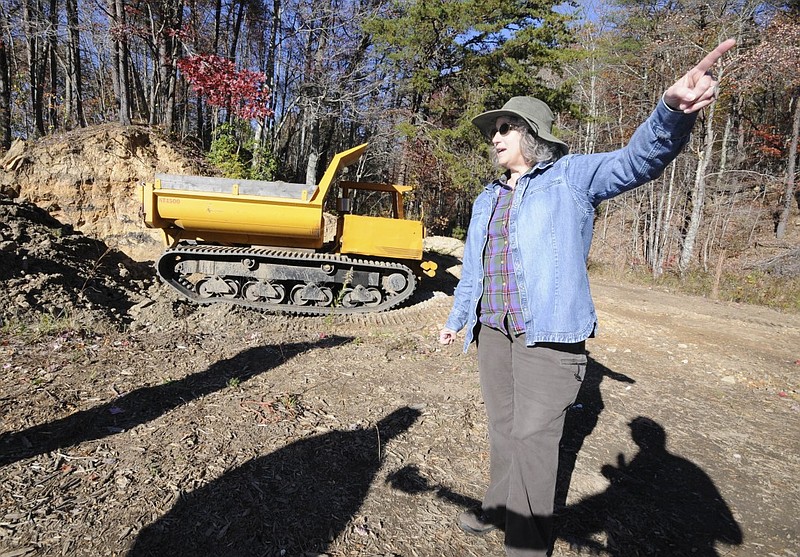Costs
* Projected cost of construction: $197,000 * Actual cost of construction: $475,000 (estimate) * Projected grant from the state to Walker County: $100,000 * Actual grant from the state to Walker County: $40,000
After a three-year dispute with the state environmental agency, Walker County officials will be in the clear once they absorb one last hit.
It's going to hurt. Like, $100,000 worth of pain. Maybe worse.
The Georgia Environmental Protection Division first alerted Walker County in 2012 that there were problems with the construction of the Durham Trail, a hiking route that crosses Rock Creek on Lookout Mountain. EPD officials said the county never told them they were working near the creek, breaking state law.
"If they had [requested a permit] up front, we probably would not have approved what they originally built," said Bert Langley, EPD director of compliance. "They wouldn't have installed it."
In September 2013, more than a year after the EPD first learned of the problem, the agency punished Walker County. They would have to correct all the problems they created, like dumping dirt in the water and re-routing the creek stream in a way that stopped trout from swimming upstream.
And the county would have to finish its solution in one year.
The county chose to build a walking bridge over the stream. That way, people could still use the Durham Trail without harming the water. Problem is, the county missed its deadline. Instead of finishing on Sept. 11, Langley said, Walker County didn't complete the bridge and all other demands until the middle of February.
According to the consent order that Commissioner Bebe Heiskell signed, the county was on the hook for a $1,000-per-day fine for each day construction was late.
Langley said the EPD will not fine Walker County for days when the weather was too bad for construction. Agency officials have not settled on the total amount of the fine. But, not including all those bad-weather days, Walker County would need to pay $156,000.
This is for a local government with a $22 million annual budget that is also trying to figure out how to pay off a $4.5 million loan to Regions Bank.
Langley said the EPD has to punish Walker County.
"The state law does not allow us to ignore that," he said of the missed deadline.
Whether it's $156,000 or considerably less, this last payment to the EPD will be the end of a project that has cost Walker County officials much more than they expected. The county first began planning the hiking trail in 2007, when the Georgia Department of Natural Resources awarded Walker County a $100,000 grant.
That was supposed to cover about half of the county's expenses for the project, according to a 2008 document. But the county spent a lot more, and the grant was worth a lot less.
Not including the last fine that looms over Walker County officials' heads, the trail cost about $475,000, public records and emails show. And of that $100,000 grant, the county only received about $40,000.
Emails from Bryan Alexander, the grant coordinator at the time of the project, show that Walker County did not get the full grant because it spent more money on engineering than the state would allow. The county also asked for a reimbursement for work on a different trail, as well as for employee salaries and the cost to rent equipment, expenses not covered in the grant.
Heiskell did not return a call seeking comment, and County Attorney Don Oliver said officials were not allowed to comment on the trail until the issues with the EPD were "wrapped up," even though Heiskell denied any potential fines to multiple media outlets in December.
A month ago, Oliver sent an email to the Times Free Press saying that the Durham Trail is going to be a bright spot for all of Walker County. The trail, which is not complete, will end at the Cloudland Connector Trail, which runs to Cloudland Canyon State Park, which has several other trails.
"It will be as nice as any trail in the [Southeast] and a tremendous asset for the citizens of the tri-state area," Oliver wrote.
Bobby Davenport, a trustee with the Lula Lake Land Trust, which built the Cloudland Connector Trail, said Walker County is actually paying for mistakes made by railroad builders more than 100 years ago. The Durham Trail follows the tracks of a railroad built at the turn of the century.
Davenport said this work damaged the creek, and the EPD blamed Walker County.
"They've been given a lot of grief for fixing something that they didn't break," he said. "Somebody's got to do it and make the world a better place."
Langley said this is not true. Nobody made the county build a trail there, plus the county broke state law.
Of the $475,000 Walker County spent on this project so far, about $290,000 of it went toward building the walking bridge that now stands above Rock Creek, according to an email from Philip Schofield, an engineer on the project. Langley said the EPD did not make the county build a bridge.
"That generated a significant cost," he said. "But that in and of itself was the result of either misunderstanding or just poor judgment."
If the county didn't build a bridge, though, what could it have done? How could it continue the trail past Rock Creek?
Pressed for an answer, Langley said he wouldn't have built the trail.
Contact Staff Writer Tyler Jett at tjett@times freepress.com or 423-757-6476.
